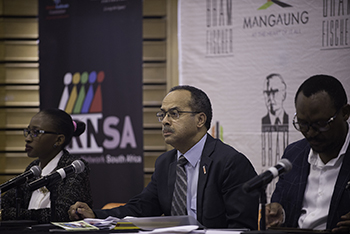 Ms Nokuthula Sithole, Dr Danny Titus, and Mr Qondile Khedama
Photo: Lihlumelo Toyana |
“Racism is, and has been, alive among us as the people of South Africa for a long time, and we therefore need organisations such as ARNSA to create spaces for us to speak up on issues of racism.” The Executive Mayor of the Mangaung Metro Municipality, Counsellor Thabo Manyoni, urged South Africans and the people of the local Metro to speak up on issues relevant to racism. He was speaking at the launch of the Free State chapter of the Anti-racism Network of South Africa (ARNSA) in Bloemfontein.
The Institute for Reconciliation and Social Justice (IRSJ) at the University of the Free State (UFS) is partnered in this endeavour by the Mangaung Metro Municipality, the Ahmed Kathrada Foundation, the Foundation for Human Rights, the Nelson Mandela Foundation, Churches against Racism in Southern Africa (CARS) and the Department of Justice and Constitutional Development.
The ARNSA launch was followed by a dialogue led by Dr Danny Titus, Mr Qondile Khedama, and Prof Christina Landman. JC van der Merwe, the Deputy Director of the IRSJ at the UFS, said that the ARNSA initiative has the potential to unite all South Africans in appreciating and respecting the humanity of all people, as well as to mobilise people to fight against racism. His sentiments were echoed by Sean Moodley, the national ARNSA coordinator. Moodley said that we all have to take on racism; to learn about it, speak out against it, and act to stop it.